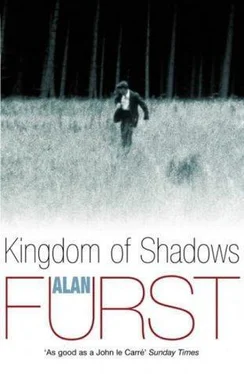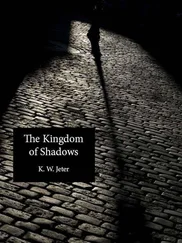Alan Furst - Kingdom of Shadows
Здесь есть возможность читать онлайн «Alan Furst - Kingdom of Shadows» весь текст электронной книги совершенно бесплатно (целиком полную версию без сокращений). В некоторых случаях можно слушать аудио, скачать через торрент в формате fb2 и присутствует краткое содержание. Жанр: Шпионский детектив, на английском языке. Описание произведения, (предисловие) а так же отзывы посетителей доступны на портале библиотеки ЛибКат.
- Название:Kingdom of Shadows
- Автор:
- Жанр:
- Год:неизвестен
- ISBN:нет данных
- Рейтинг книги:5 / 5. Голосов: 1
-
Избранное:Добавить в избранное
- Отзывы:
-
Ваша оценка:
- 100
- 1
- 2
- 3
- 4
- 5
Kingdom of Shadows: краткое содержание, описание и аннотация
Предлагаем к чтению аннотацию, описание, краткое содержание или предисловие (зависит от того, что написал сам автор книги «Kingdom of Shadows»). Если вы не нашли необходимую информацию о книге — напишите в комментариях, мы постараемся отыскать её.
Kingdom of Shadows — читать онлайн бесплатно полную книгу (весь текст) целиком
Ниже представлен текст книги, разбитый по страницам. Система сохранения места последней прочитанной страницы, позволяет с удобством читать онлайн бесплатно книгу «Kingdom of Shadows», без необходимости каждый раз заново искать на чём Вы остановились. Поставьте закладку, и сможете в любой момент перейти на страницу, на которой закончили чтение.
Интервал:
Закладка:
Morath had always liked the Novembers of Paris. It rained, but the bistros were warm, the Seine dark, the lamps gold, the season’s love affairs new and exciting. The 1938 November began well enough, tout Paris ecstatic that it wouldn’t have to go to war. But then, Kristallnacht, on the night of 9 November, and in the shimmering tons of shattered Jewish glass could be read, more clearly than anybody liked, what was coming. Still, it wasn’t coming here. Let Hitler and Stalin rip each other’s throats out, went that week’s thinking, we’ll go up to Normandy for the weekend.
Morath arranged to meet his uncle at some cuisine grand-mere hole-in-the-wall out in Clichy. He’d spent ten days in Budapest, collecting money, listening to poor Szubl’s misadventures with the redheaded chorus girl he’d met at the nightclub. Then the two of them had hidden the cash in a cello and taken the night express back to Paris. For the moment, Morath was a man with well over two million pengo in his closet.
It was obvious to Morath that Count Polanyi had gotten an early start on lunch. Trying to sit down, he lurched into the neighboring table, very nearly causing a soup accident and drawing a sharp glance from the grand-mere. “It seems the gods are after me today,” he said, in a gust of cognac fumes.
It wasn’t the gods. The pouches beneath his eyes had grown alarmingly and darkened.
Polanyi peered at the chalked menu on the blackboard. “Andouillette,” he said.
“I hear you’ve been away,” Morath said.
“Yes, once again I’m a man with a house in the country, what’s left of it.” On 2 November, the Vienna Commission-Hitler-had awarded Hungary, in return for supporting Germany during the Sudeten crisis, the Magyar districts of southern Czechoslovakia. Twelve thousand square miles, a million people, the new border running from Pozsony/Bratislava all the way east to Ruthenia.
The waiter arrived with a carafe of wine and a plate of snails.
“Uncle Janos?”
“Yes?”
“How much do you know about what happened to me in Roumania?”
From Polanyi’s expression it was clear he didn’t want to talk about it. “You had difficulties. It was seen to.”
“And that’s that.”
“Nicholas, don’t be cross with me. Basically, you were lucky. Had I left the country two weeks earlier you might have been gone for good.”
“But, somehow, you heard about it.”
Polanyi shrugged.
“Did you hear that Sombor appeared? At the Bistrita police station?”
His uncle raised an eyebrow, speared a snail on the third try and ate it, dripping garlic butter on the table. “Mmm? What’d he want?”
“Me.”
“Did he get you?”
“No.”
“So where’s the problem?”
“Perhaps Sombor is a problem.”
“Sombor is Sombor.”
“He acted like he owned the world.”
“He does.”
“Was he responsible for what happened to me?”
“Now that’s an interesting idea. What would you do if he was?”
“What would you suggest?”
“Kill him.”
“Are you serious?”
“Kill him, Nicholas, or don’t ruin my lunch. Choose one.”
Morath poured himself a glass of wine and lit a Chesterfield. “And the people who rescued me?”
“ Tres cher, Nicholas.”
“Who shall I thank for it?”
“Somebody owed me a favor. Now I owe him one.”
“Russian? German?”
“Eskimo! My dear nephew, if you’re going to be inquisitive and difficult about this …”
“Forgive me. Of course I’m grateful.”
“Can I have the last snail? That grateful?”
“At least that.”
Polanyi jammed the tiny fork into the snail and frowned as he worked it free of its shell. Then, for a moment, he looked very sad. “I’m just an old, fat Hungarian man, Nicholas. I can’t save the world. I’d like to, but I can’t.”
The last days of November, Morath pulled his overcoat tight and hurried through the streets of the Marais to the Cafe Madine. It was, Morath thought, frozen in time. Empty, as before, in the cold morning light, a cat asleep on the counter, the patron with his spectacles down on his nose.
The patron, Morath suspected, remembered him. Morath ordered a cafe au lait and, when it came, warmed his hands on the bowl. “I was here, once before,” he said to the patron. “Last March, I think it was.”
The patron gave him a look. Really?
“I met an old man. I can’t recall his name, I don’t think he mentioned it. At the time, a friend of mine had difficulties with a passport.”
The owner nodded. Yes, that sort of thing did happen, now and then. “It’s possible. Somebody like that used to come here, once in a while.”
“But not anymore.”
“Deported,” the owner said. “In the summer. He had a little problem with the police. But for him, the little problem became a big problem, and they sent him back to Vienna. After that, I can’t say.”
“I’m sorry to hear it,” Morath said.
“He is also sorry, no doubt.”
Morath looked down, felt the height of the wall between him and the patron, and understood there was nothing more to be said. “He had a friend. A man with a Vandyke beard. Quite educated, I thought. We met at the Louvre.”
“The Louvre.”
“Yes.”
The patron began drying a glass with a cloth, held it up to the light, and put it back on the shelf. “Cold, today,” he said.
“Perhaps a little snow.”
“You think so?”
“You can feel it in the air.”
“Maybe you’re right.” He began wiping the bar with the cloth, lifting Morath’s bowl, scooping up the cat and setting it gently on the floor. “You must let me clean, Sascha,” he said.
Morath waited, drinking his coffee. A woman with a baby in a blanket went past in the street.
“It’s quiet here,” Morath said. “Very pleasant.”
“You should come more often, then.” The patron gave him a tart smile.
“I will. Perhaps tomorrow.”
“We’ll be here. God willing.”
It took a half hour, the following morning. Then a woman-the woman who had picked up the money and, Morath remembered, kissed him on the steps of the Louvre, appeared at the cafe. “He’ll see you,” she told Morath. “Try at four-fifteen tomorrow, in the Jussieu Metro station. If he can’t get there, try the next day, at three-fifteen. If that doesn’t work, you’ll have to find another way.”
He wasn’t there on the first try. The station was crowded, late in the day, and if somebody was taking a look at him, making sure there were no detectives around, Morath never saw it. On the second day, he waited forty-five minutes, then gave up. As he climbed the stairs to the street, the man fell in step with him.
Not as portly as Morath remembered him, he still wore the Vandyke beard and the tweed suit, and something about him suggested affinity with the world of commercial culture. The art dealer. He was accompanied, as before, by a man with a white, bony face who wore a hat set square on a shaven head.
“Let’s take a taxi,” the art dealer said. “It’s too cold to walk.”
The three of them got in the back of a taxi that was idling at the curb. “Take us to the Ritz, driver,” said the art dealer.
The driver laughed. He drove slowly down the rue Jussieu and turned into the rue Cuvier.
“So,” the art dealer said. “Your friends still have problems with their papers.”
“Not this time,” Morath said.
“Oh? Then what?”
“I would like to meet somebody in the diamond business.”
“You’re selling?”
“Buying.”
Читать дальшеИнтервал:
Закладка:
Похожие книги на «Kingdom of Shadows»
Представляем Вашему вниманию похожие книги на «Kingdom of Shadows» списком для выбора. Мы отобрали схожую по названию и смыслу литературу в надежде предоставить читателям больше вариантов отыскать новые, интересные, ещё непрочитанные произведения.
Обсуждение, отзывы о книге «Kingdom of Shadows» и просто собственные мнения читателей. Оставьте ваши комментарии, напишите, что Вы думаете о произведении, его смысле или главных героях. Укажите что конкретно понравилось, а что нет, и почему Вы так считаете.












